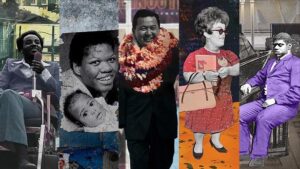An African American composer and pianist known as one of the greatest musicians of the 19th century, Thomas Wiggins (1849-1908) was blind from birth and likely autistic. Although born into slavery, Wiggins was the first African American to perform at the White House, and toured throughout the U.S., South America, and Europe.
Educational Resources: Thomas Wiggins: Composing the Future PBS LearningMedia Video, Discussion Questions and Teaching Tips (Grades 9-12)
Watch Full Episode(Open Captioning + ASL)
Watch Full Episode(Extended Audio Description + Open Captioning)
Learn More About Thomas Wiggins
Learn More about American Masters Renegades
More About Thomas Wiggins: (1849-1908) was an African American composer and pianist known as one of the greatest musicians of the 19th century.
Wiggins was blind from birth and likely autistic. Although born into slavery, he was the first African American to perform at the White House, and toured throughout the U.S., Canada, and Europe. Billed as “Blind Tom, The Blind Negro Boy Pianist” he became the highest grossing, most ticketed act of his time. After the Emancipation Proclamation went into effect in 1863, Thomas Wiggins was fought over in the courts like a piece of property, leading to him being placed under a conservatorship until his death. In the course of his career, Wiggins earned his owners the largest fortune ever attained by a pianist at the time, the equivalent of over $32 million today.
Today, an estimated 1.3 million disabled people are under conservatorship or guardianship in the United States, and this intersection of disability, guardianship, and artistic exploitation continues to pervade our contemporary narratives, such as the recent public discourse surrounding the guardianship of pop icon Britney Spears, making this film exceedingly timely. Through Wiggins’ story, Renegades explores the broader, systemic issues related to lack of agency for individuals kept under conservatorships, and pose critical questions about our definitions of individual capacity, control, and freedom.
The episode features interviews with: Angela Miles-Williams, a descendant of Thomas Wiggins; jazz pianist Matthew Whitaker; composer and musicologist George E. Lewis; classical pianist John Davis; Lydia X.Z. Brown, Founding Executive Director of The Autistic People of Color Fund; and Dr. Dwandalyn Reece, Curator of Music and Performing Arts at the Smithsonian Institution’s National Museum of African American History and Culture. The episode also features performances by: Lachi, Matthew Whitaker, and John Davis.


